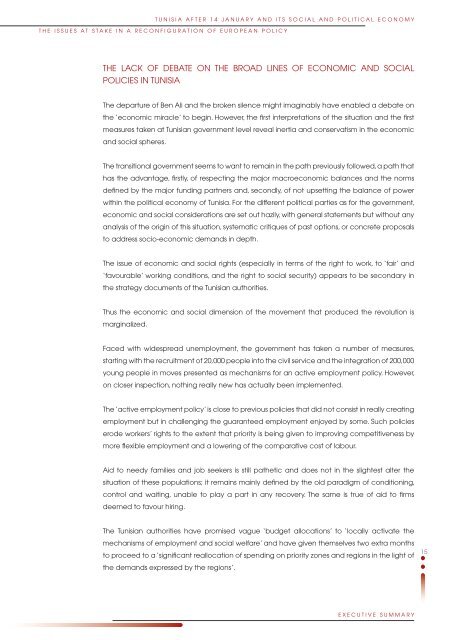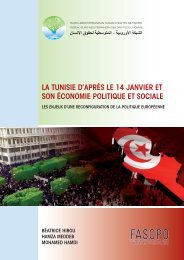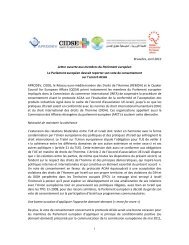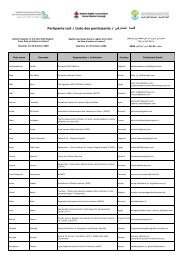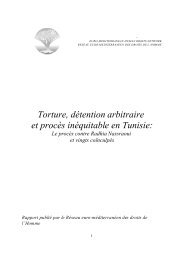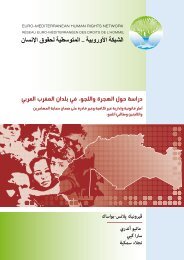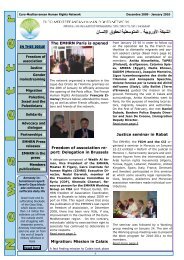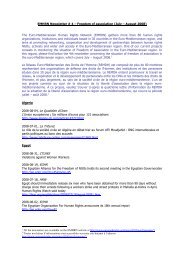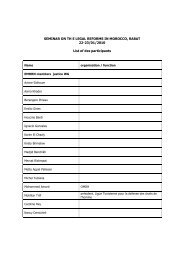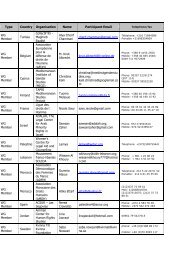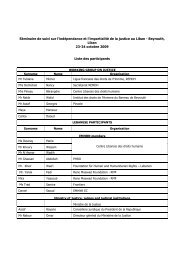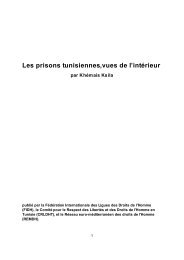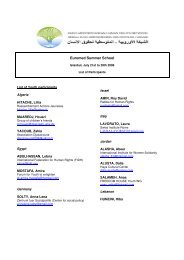tunisia after 14 january and its social and political economy - Refworld
tunisia after 14 january and its social and political economy - Refworld
tunisia after 14 january and its social and political economy - Refworld
Create successful ePaper yourself
Turn your PDF publications into a flip-book with our unique Google optimized e-Paper software.
T U N I S I A A F T E R 1 4 J A N U A R Y A N D I T S S O C I A L A N D P O L I T I C A L E C O N O M YT H E I S S U E S A T S T A K E I N A R E C O N F I G U R A T I O N O F E U R O P E A N P O L I C YThe lack of debate on the broad lines of economic <strong>and</strong> <strong>social</strong>policies in TunisiaThe departure of Ben Ali <strong>and</strong> the broken silence might imaginably have enabled a debate onthe ‘economic miracle’ to begin. However, the first interpretations of the situation <strong>and</strong> the firstmeasures taken at Tunisian government level reveal inertia <strong>and</strong> conservatism in the economic<strong>and</strong> <strong>social</strong> spheres.The transitional government seems to want to remain in the path previously followed, a path thathas the advantage, firstly, of respecting the major macroeconomic balances <strong>and</strong> the normsdefined by the major funding partners <strong>and</strong>, secondly, of not upsetting the balance of powerwithin the <strong>political</strong> <strong>economy</strong> of Tunisia. For the different <strong>political</strong> parties as for the government,economic <strong>and</strong> <strong>social</strong> considerations are set out hazily, with general statements but without anyanalysis of the origin of this situation, systematic critiques of past options, or concrete proposalsto address socio-economic dem<strong>and</strong>s in depth.The issue of economic <strong>and</strong> <strong>social</strong> rights (especially in terms of the right to work, to ‘fair’ <strong>and</strong>‘favourable’ working conditions, <strong>and</strong> the right to <strong>social</strong> security) appears to be secondary inthe strategy documents of the Tunisian authorities.Thus the economic <strong>and</strong> <strong>social</strong> dimension of the movement that produced the revolution ismarginalized.Faced with widespread unemployment, the government has taken a number of measures,starting with the recruitment of 20,000 people into the civil service <strong>and</strong> the integration of 200,000young people in moves presented as mechanisms for an active employment policy. However,on closer inspection, nothing really new has actually been implemented.The ‘active employment policy’ is close to previous policies that did not consist in really creatingemployment but in challenging the guaranteed employment enjoyed by some. Such policieserode workers’ rights to the extent that priority is being given to improving competitiveness bymore flexible employment <strong>and</strong> a lowering of the comparative cost of labour.Aid to needy families <strong>and</strong> job seekers is still pathetic <strong>and</strong> does not in the slightest alter thesituation of these populations; it remains mainly defined by the old paradigm of conditioning,control <strong>and</strong> waiting, unable to play a part in any recovery. The same is true of aid to firmsdeemed to favour hiring.The Tunisian authorities have promised vague ‘budget allocations’ to ‘locally activate themechanisms of employment <strong>and</strong> <strong>social</strong> welfare’ <strong>and</strong> have given themselves two extra monthsto proceed to a ‘significant reallocation of spending on priority zones <strong>and</strong> regions in the light of15the dem<strong>and</strong>s expressed by the regions’.E x e c u t i v e S u m m a r y


